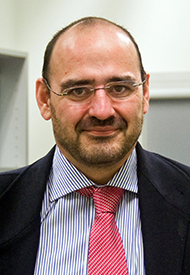News
LATEST NEWS AND EVENTS FROM THE SCHOOL OF ENGINEERING
"Robots and artificial intelligence facilitate a better quality of work, they do not lead to a decline in social welfare, on the contrary".
Interview with Ángel Rubio, Professor of Biostatistics and Bioinformatics at the University of Barcelona. Tecnun

This Thursday, January 10 at the Alumni Building of the Campus of the University of Navarra in Madrid will take place the lecture: DATA ANALYTICS, application to personalized medicine, to position of the professor of Tecnun Angel Rubio. The talk can be followed live at 8 p.m. via Youtube Live at the following link: https://youtu.be/ApeiBWwwejk.
We reproduce below an extract from the interview recently conducted with Professor Ángel Rubio by José Luis Orihuela, also a university professor, lecturer and writer. It analyses the impact of technological innovations on modes and means of communication. You can find the full version on Telefónica Data Unit's LUCA blog(https://data-speaks.luca-d3.com/2018/12/inteligencia-artificial-y-robotica.html)(https://luca-d3.com/index.html).
What is artificial intelligence?
Artificial intelligence is the set of methodologies that, using large amounts of data and computers, allow conclusions to be drawn and concepts to be abstracted from that data, which were not obvious. In some aspects, artificial intelligence can behave similarly to that of an expert in the field being analyzed.
By civil service examination to natural intelligence, what we would have here is the possibility of working with more information and faster?
Of course, with more information. The point is that today we are still not able to solve problems as complicated as those that a person can solve. Right now it is difficult to have a completely autonomous robot in an unfamiliar environment, outside a laboratory. The substantial difference is that computers can use much more data and solve problems based on data that exceed a person's ability to handle.
On the contemporary public discussion autonomous cars and the future of work appear as dominant themes, what other issues are we missing?
Above all, the financial aid in decision making. For example, the dashboards of a large company. That, right now, is more important than autonomous cars. Regarding fears about the future of work due to the impact of technology, history sample is that progress makes your job easier, and makes jobs more human. That robots have taken jobs away from car factory operators? Well, they are welcome, so that a person does not have to be putting nuts for forty years of his life, 8 hours a day.
Robots and artificial intelligence facilitate a better quality of work, they do not produce a setback in social welfare, but on the contrary. Today it would be unthinkable to do the accounting of a department store without a computer, perhaps fewer accountants are needed than at the beginning of the last century, but that's okay. Instead of doing accounting, we are doing something else.
And what topics in artificial intelligence are absent from the public conversation?
What does who knows who about me, I think, is something that's important, as well as avoiding abusive clauses from technology providers. Another big topic is the use of Big Data in medicine to find new drugs for cancer and autoimmune diseases, as well as to study aging.
Where are the research and applications of artificial intelligence going in your field?
In the medical field, the search for new drugs (taking advantage, also of data collected by wearable devices) and the analysis of the human genome.
Are advances in robotics and artificial intelligence leading us to a progressive dissolution of the human/machine frontiers? Are we heading towards a permanent Turing Test status ?
It is almost impossible to build a kind of Terminator, you would need a huge battery to run such a robot. In a few years it will be possible to build machines that pass the Turing Test. Machines that, without seeing them, will not allow you to distinguish whether you are talking to a person or a machine. Where it will be more difficult to advance is in the mechanical aspect. Robots are subject to the laws of mechanics. Now, computers (not robots) that are able to behave like a person, or pass the Turing Test, that's going to happen. But, in the topic of autonomous robotics, there is a physical limitation that is the mechanics itself.
